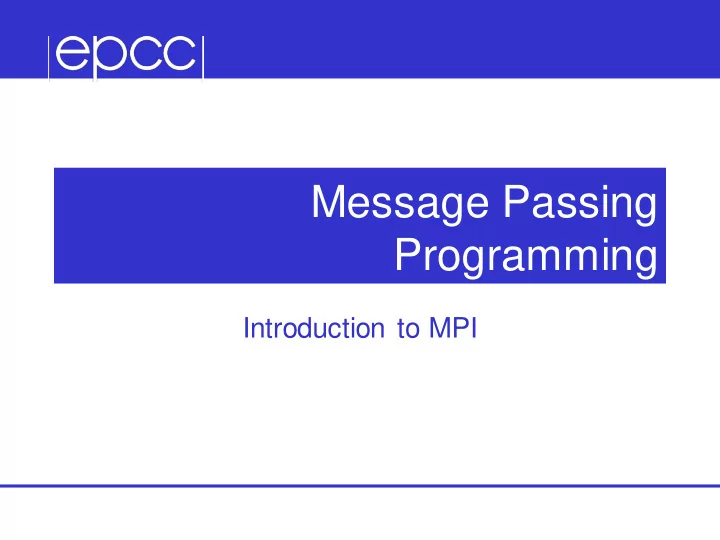

Message Passing Programming Introduction to MPI
What is MPI?
MPI Forum First message-passing interface standard. Sixty people from forty different organisations. Users and vendors represented, from the US and Europe. Two-year process of proposals, meetings and review. Message Passing Interface document produced in 1993
Implementation MPI is a library of function/subroutine calls MPI is not a language There is no such thing as an MPI compiler The C or Fortran compiler you invoke knows nothing about what MPI actually does – only knows prototype/interface of the function/subroutine calls
Goals and Scope of MPI MPI's prime goals are: – To provide source-code portability. – To allow efficient implementation. It also offers: – A great deal of functionality. – Support for heterogeneous parallel architectures.
Header files C: #include <mpi.h> Fortran 77: include 'mpif.h' Fortran 90: use mpi
MPI Function Format C: error = MPI_Xxxxx(parameter, ...); MPI_Xxxxx(parameter, ...); Fortran: CALL MPI_XXXXX(parameter, ..., IERROR)
Handles MPI controls its own internal data structures. MPI releases `handles' to allow programmers to refer to these. C handles are of defined typedefs . Fortran handles are INTEGERs .
Initialising MPI C: int MPI_Init(int *argc, char ***argv) Fortran: MPI_INIT(IERROR) INTEGER IERROR Must be the first MPI procedure called. – but multiple processes are already running before MPI_Init
MPI_Init int main(int argc, char *argv[]) { ... MPI_Init(&argc, &argv); ... int main() { ... MPI_Init(NULL, NULL); ... program my_mpi_program integer :: ierror ... CALL MPI_INIT(IERROR)
MPI_COMM_WORLD Communicators MPI_COMM_WORLD 0 1 4 2 3 5 6
Rank How do you identify different processes in a communicator? MPI_Comm_rank(MPI_Comm comm, int *rank) MPI_COMM_RANK(COMM, RANK, IERROR) INTEGER COMM, RANK, IERROR The rank is not the physical processor number. – numbering is always 0, 1, 2, ...., N-1
MPI_Comm_rank int rank; ... MPI_Comm_rank(MPI_COMM_WORLD, &rank); printf(“Hello from rank %d \ n”, rank); ... integer :: ierror integer :: rank ... CALL MPI_COMM_RANK(MPI_COMM_WORLD, rank, ierror) write(*,*) ‘Hello from rank ‘, rank ...
Size How many processes are contained within a communicator? MPI_Comm_size(MPI_Comm comm, int *size) MPI_COMM_SIZE(COMM, SIZE, IERROR) INTEGER COMM, SIZE, IERROR
Exiting MPI C: int MPI_Finalize() Fortran: MPI_FINALIZE(IERROR) INTEGER IERROR Must be the last MPI procedure called.
Aborting MPI Aborting the execution from any processor (e.g. error condition) C: int MPI_Abort(MPI_Comm comm,int errorcode) Fortran: MPI_ABORT(COMM, ERRORCODE, IERROR) INTEGER COMM, ERRORCODE, IERROR Behaviour – will abort all processes even if only called by one process – this is the ONLY MPI routine that can have this effect – only use as a last- resort “nuclear” option!
What machine am I on? Can be useful on a cluster – e.g. to confirm mapping of processes to nodes/processors/cores integer namelen character*(MPI_MAX_PROCESSOR_NAME) :: procname ... call MPI_GET_PROCESSOR_NAME(procname, namelen, ierror) write(*,*) ‘rank ‘, rank, ‘ is on machine ‘, procname(1:namelen) int namelen; char procname[MPI_MAX_PROCESSOR_NAME]; ... MPI_Get_processor_name(procname, &namelen); printf (“rank %d is on machine %s \n", rank, procname);
Summary Have some covered basic calls – but no explicit message-passing yet Can still write useful programs – eg a task farm of independent jobs Need to compile and launch parallel jobs – procedure is not specified by MPI – next lecture gives machine-specific details
Recommend
More recommend